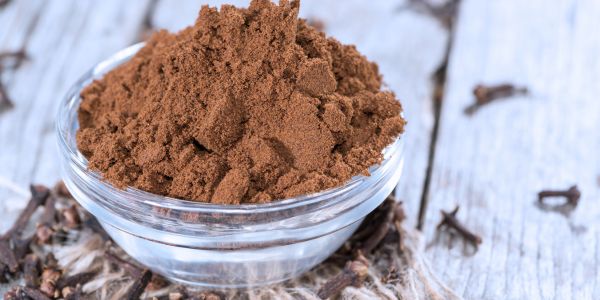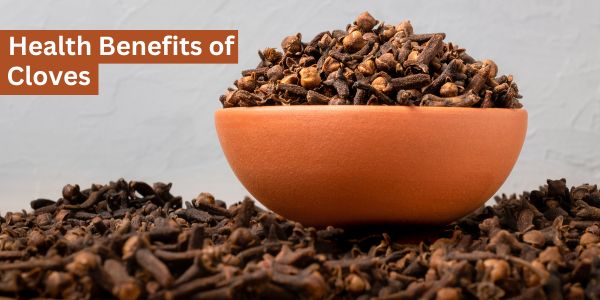The Powerful Benefits of Clove and It’s Culinary Potential

Introduction
In the vast realm of culinary spices, few can match the potency and versatility of cloves. These small, nail-shaped flower buds from the evergreen clove tree (Syzygium aromaticum) have been prized for centuries, not just for their distinctive flavor and aroma, but also for their remarkable health benefits. As we embark on this flavorful journey, we’ll explore the myriad ways cloves can enhance both our health and our culinary experiences.
Picture, if you will, a tiny, nail-shaped bud that packs a punch far beyond its diminutive size. This, dear reader, is the humble yet mighty clove – a spice that has tantalized taste buds, healed ailments, and sparked global expeditions for millennia. As we set sail on this aromatic adventure, prepare to have your senses awakened and your culinary horizons expanded by the extraordinary world of cloves. the vast realm of culinary spices, few can match the potency and versatility of cloves.
The Rich History of Cloves
To truly appreciate the significance of cloves, we must first journey back through the annals of history. The story of cloves is one of adventure, greed, and cultural exchange that spans continents and centuries.
Ancient Origins
Our tale begins in the lush, tropical Maluku Islands of Indonesia, also known as the fabled Spice Islands. Here, amidst volcanic soils and equatorial warmth, the clove tree (Syzygium aromaticum) has thrived for countless generations. The indigenous people of these islands discovered the potent properties of cloves long before they caught the attention of the wider world. Local Legends: Malukan folklore speaks of clove trees as gifts from the gods, planted in the shape of a human body to symbolize the connection between earth and heaven. The locals used cloves not just for flavoring food, but also in traditional medicine and religious rituals. They would chew on cloves to freshen their breath before approaching their deities in prayer.
Ancient Civilizations and Cloves
As trade routes expanded and civilizations connected, the allure of cloves spread far beyond their native islands. Chinese Dynasties: As early as 200 BCE, courtiers in the Han Dynasty would chew on cloves to freshen their breath before addressing the emperor. Chinese texts from this period also mention cloves as a treatment for various ailments.
Roman Empire: By the 1st century CE, cloves had reached the Roman Empire. Pliny the Elder wrote about this exotic spice in his encyclopedic work \”Natural History,\” describing its use in perfumes and medicines.• Arab Traders: The Arab world played a crucial role in the clove trade, acting as middlemen between the Spice Islands and European markets. They carefully guarded the secret of cloves’ origin, spinning tales of dangerous journeys to mysterious lands to justify the spice’s high price.
The Spice Trade Revolution
The quest for cloves played a significant role in the Age of Exploration, with European powers vying for control over the lucrative spice trade. This competition led to the discovery of new trade routes and ultimately shaped the course of global history.
The desire for cloves and other spices was also a driving force behind the Age of Exploration, leading to world-changing events and reshaping global power structures. Portuguese Dominance: In 1511, the Portuguese conquered Malacca, gaining control of the lucrative spice trade. They established a monopoly on cloves, driving prices to astronomical heights in Europe. Dutch East India Company:
Also Read: 7 Surprising Benefits of Coffee and Creative Ways to Incorporate It Into Your Diet
The Dutch wrested control from the Portuguese in the 17th century, establishing a brutal monopoly on clove production. They restricted clove cultivation to a few islands and destroyed unauthorized clove trees, leading to conflicts with the local population. Clove Smuggling: The French and British engaged in daring acts of industrial espionage, smuggling clove seedlings out of the Dutch-controlled islands to establish their own plantations in their colonies.
Modern Era
As colonial empires crumbled and global trade expanded, cloves became more widely available and affordable. Zanzibar: In the 19th century, Zanzibar became a major clove producer, breaking the Dutch monopoly. To this day, Zanzibar and Pemba Island are known as the “Spice Islands due to their clove production. Global Cultivation: Today, cloves are cultivated in various tropical regions around the world, including Madagascar, Indonesia, India, and Sri Lanka.
The Nutritional Profile of Cloves
Cloves are not just a flavorful addition to our meals; they’re a concentrated source of various nutrients and bioactive compounds. Let’s break down the impressive nutritional profile of this potent spice:
Essential Nutrients in Cloves
- Manganese: Cloves are exceptionally rich in manganese, providing over 30% of the daily recommended intake in just one teaspoon.
- Vitamin K: Essential for blood clotting and bone health. Fiber: Aids in digestion and promotes feelings of fullness.
- Vitamins C and E: Powerful antioxidants that support immune function and skin health.
Bioactive Compounds
- Eugenol: The primary compound responsible for cloves’ distinctive aroma and many of its health benefits.
- Flavonoids: Including kaempferol and rhamnetin, which have anti-inflammatory and antioxidant properties.
- Phenolic acids: Such as gallic acid and caffeic acid, known for their antioxidant effects.
The Health Benefits of Cloves
The potent combination of nutrients and bioactive compounds in cloves contributes to a wide array of health benefits. Let’s explore some of the most significant ways cloves can enhance our well-being:

1. Powerful Antioxidant Properties
Cloves are among the most antioxidant-rich foods on the planet. These antioxidants help protect our cells from damage caused by free radicals, potentially reducing the risk of chronic diseases and slowing the aging process.
2. Anti-Inflammatory Effects
The eugenol in cloves has been shown to have strong anti-inflammatory properties, which may help in managing inflammatory conditions such as arthritis and reducing the risk of chronic diseases associated with inflammation.
3. Antimicrobial and Antifungal Action
Cloves have natural antimicrobial properties that can help fight harmful bacteria, fungi, and viruses. This makes them useful in: Oral health: Clove oil is often used to relieve toothache and fight oral bacteria. Food preservation: The antimicrobial properties of cloves make them an effective natural preservative.
4. Digestive Health Support
Cloves have been used traditionally to aid digestion. They can: Stimulate the production of digestive enzymes Reduce bloating and gas Help alleviate nausea
5. Blood Sugar Regulation
Some studies suggest that cloves may help improve insulin sensitivity and lower blood sugar levels, making them potentially beneficial for people with or at risk of type 2 diabetes.
Latest Health Tips
- 10 Natural Ways to Regrow Your Hair
- 9 Benefits of Eating an Apple Every Day
- 10 Benefits of Castor Oil and How to Incorporate It Into Your Diet
- 10 Foods You Should Never Refrigerate
- Seeds You Should Never Eat, What to Eat Instead
6. Bone Health
The manganese and other minerals in cloves contribute to bone health, potentially reducing the risk of osteoporosis and supporting overall skeletal strength.
7. Liver Protection
Research indicates that cloves may have hepatoprotective properties, helping to protect the liver from damage and supporting its vital functions.
8. Potential Cancer-Fighting Properties
While more research is needed, preliminary studies suggest that certain compounds in cloves may have anti-cancer properties, particularly against lung and liver cancer cells.
Incorporating Cloves into Your Diet: Creative Culinary Applications
Now that we’ve explored the impressive health benefits of cloves, let’s dive into the exciting world of culinary applications. Cloves’ unique flavor profile – warm, sweet, and slightly bitter – makes them a versatile spice that can enhance both sweet and savory dishes.
1. Beverages
- Spiced Tea: Add a whole clove to your black tea for a warm, aromatic twist.
- Mulled Wine: Cloves are a key ingredient in this traditional winter beverage, adding depth and warmth.
- Clove-Infused Water: For a subtle flavor boost and potential health benefits, add a few cloves to your water bottle.
2. Baking
- Gingerbread: The classic holiday treat wouldn’t be complete without the warm spice of cloves.
- Spiced Pumpkin Pie: Cloves complement the sweetness of pumpkin perfectly.
- Fruit Cakes and Puddings: Add ground cloves to these dense, rich desserts for extra flavor complexity.
3. Savory Dishes
- Marinades: Include ground cloves in marinades for meat, especially pork and lamb.
- Curries and Stews: A pinch of ground cloves can add depth to these hearty dishes.
- Spice Rubs: Create a unique spice rub for grilled meats by combining ground cloves with other spices like paprika and cumin.
4. Preserves and Pickles
- Pickled Vegetables: Add whole cloves to your pickling spice mix for flavor and natural preservation.
- Fruit Preserves: A small amount of ground cloves can enhance the flavor of apple or pear preserves.
5. Rice Dishes
- Pilaf: Stud an onion with whole cloves before adding it to your rice pilaf for a subtle, aromatic flavor.
- Biryani: This fragrant Indian rice dish often includes whole cloves as part of its spice blend.
Innovative Recipes
Let’s explore some unique recipes that showcase the versatility of cloves in both sweet and savory applications:
1. Clove-Infused Honey
Ingredients
- 1 cup raw honey
- 1 tablespoon whole cloves
Instructions
- Gently warm the honey in a small saucepan.
- Add the whole cloves and simmer on low heat for 10 minutes.
- Remove from heat and let cool completely.
- Strain out the cloves and store the infused honey in a glass jar.
- Use this aromatic honey in teas, drizzled over cheese, or as a glaze for roasted meats.
2. Clove and Orange Roasted Carrots
Ingredients
- 1 pound carrots, peeled and halved lengthwise
- 2 tablespoons olive oil
- 1 teaspoon ground cloves
- Zest of 1 orange, Salt and pepper to taste
Instructions
- Preheat oven to 400°F (200°C)
- Toss carrots with olive oil, ground cloves, orange zest, salt, and pepper.
- Spread on a baking sheet and roast for 20-25 minutes until tender and caramelized.

3. Clove-Spiced Chai Latte
Ingredients:
- 2 cups milk (dairy or plant-based)
- 2 black tea bags
- 1 cinnamon stick
- 3 whole cloves
- 2 cardamom pods, crushed
- 1-inch piece of fresh ginger, sliced
- 1 tablespoon honey
Instructions:
- In a saucepan, combine milk, tea bags, cinnamon stick, cloves, cardamom, and ginger.
- Bring to a simmer over medium heat, then reduce heat and let steep for 5 minutes
- Strain the mixture and sweeten with honey to taste.
Also Read: 4 Healthy Benefits of Coconut Oil for Your Hair
Precautions and Considerations: Using Cloves Safely
While cloves offer numerous health benefits, it’s important to use them judiciously:
- Moderation is Key: Excessive consumption of cloves can lead to side effects such as stomach upset or increased bleeding risk.
- Pregnancy and Breastfeeding: Pregnant or breastfeeding women should consult with a healthcare provider before using cloves medicinally.
- Drug Interactions: Cloves may interact with blood-thinning medications and diabetes treatments. Always consult with a healthcare professional if you’re on medication.
- Allergies: Some people may be allergic to cloves. If you experience any allergic reactions, discontinue use immediately.
Conclusion
From their rich history to their impressive health benefits and culinary versatility, cloves truly are a spice of life. By incorporating this potent spice into your diet, you’re not just enhancing the flavor of your food – you’re potentially boosting your health in numerous ways. Whether you’re sprinkling ground cloves into your morning oatmeal, using whole cloves to infuse a warming beverage, or experimenting with clove-spiced savory dishes, there are countless ways to enjoy the benefits of this remarkable spice.
As we continue to rediscover the wisdom of traditional foods and spices, cloves stand out as a testament to the power of nature’s pharmacy. So why not take a moment to savor the aroma of cloves, experiment with new recipes, and let this ancient spice add a touch of warmth and wellness to your daily life? Remember, the journey to better health often begins in the kitchen, and with cloves in your spice rack, you’re well-equipped for a flavorful and healthful culinary adventure.




